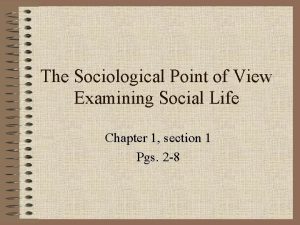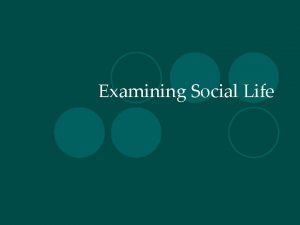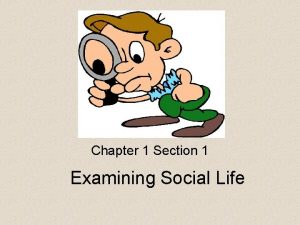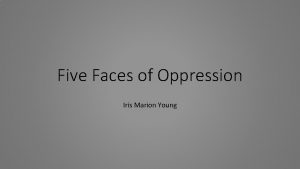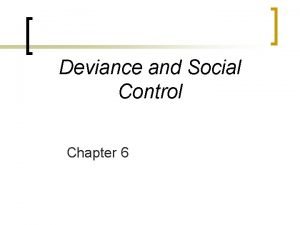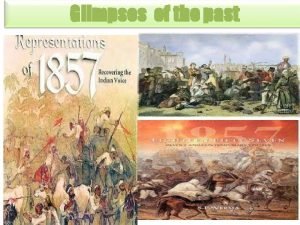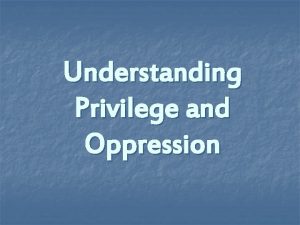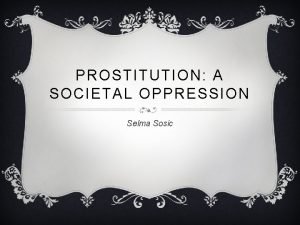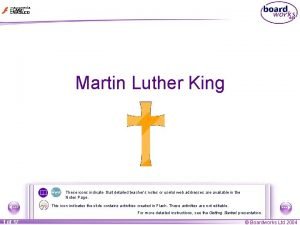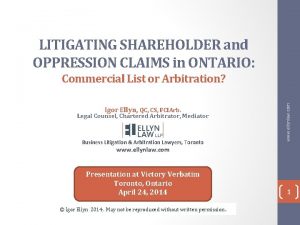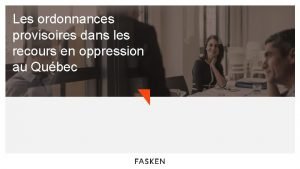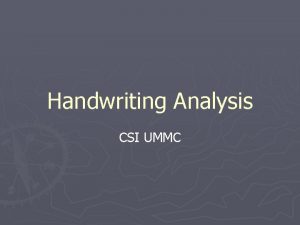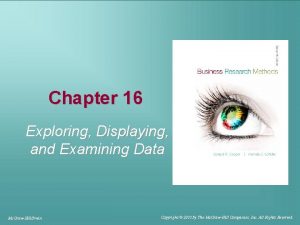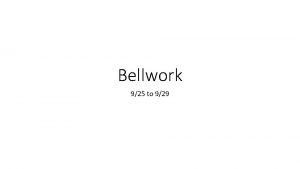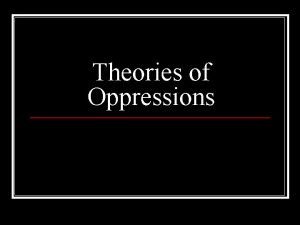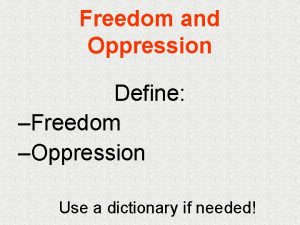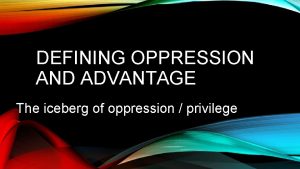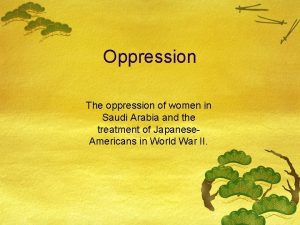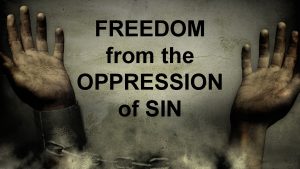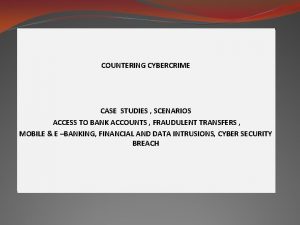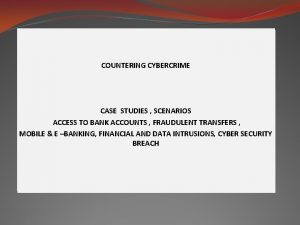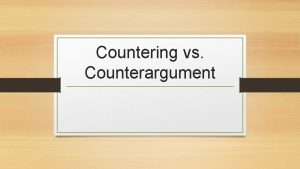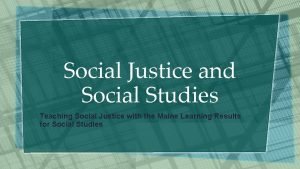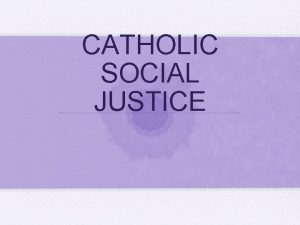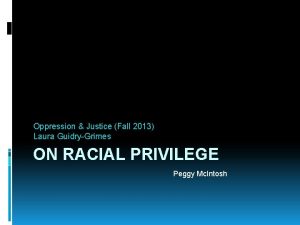COUNTERING OPPRESSION EXAMINING METROS MODEL OF SOCIAL JUSTICE















- Slides: 15

COUNTERING OPPRESSION: EXAMINING METRO’S MODEL OF SOCIAL JUSTICE EDUCATION By Rama Ali Kased Ed. D Research Symposium Feb. 2014 1

The Problem • The gap in graduation rates of low-income, underrepresented students and more affluent students in higher education (Engle & Lynch, 2009; Brock 2010). • The high drop rates of low-income, first-generation, and underrepresented students during their first two years at the university (Choy, 2001; Ishitani, 2006; Pascarella, Pierson, Wolniak, & Terenzini, 2004). 2

The Problem • The challenges and difficulties students face during college adjustment (Terenzini, Springer, Yaeger, Pascarella, & Nora, 1996) • First-generation students often feel disengaged, marginalized, and isolated in the college environment (Choy, 2001; Bernal, Aleman, & Garavito, 2009; Jehangir, 2010). 3

Focus of Study Metro Academy Program (Metro) at San Francisco State University First Year Experience • Metro Course 4 Metro Course • Metro Course

Research Design An embedded mixed methods, case study approach was used to examine the Metro Academy Program. QUAL quant 5

Research Questions • Qualitative Data How is the social justice model of the Metro Academy Program manifested in the lives of first-generation, students of color, and what influences does the social justice model of Metro Academy Program have on their educational and personal experiences? • Quantitative Data What are the impacts of the Metro Academy Program on the academic outcomes of its students when compared to other SF State first- and second-year students? 6

Theoretical Framework • Social Justice Education (also part of the literature review) O O O O 7 Critical Consciousness and Agency Critical Pedagogy Culturally and Socially Relevant and Responsive Pedagogy “Schooling In Capitalist America” Critical Race Theory Community Cultural Wealth and Knowledge Radical Healing and Community Reconciliation

Methodology • Qualitative: data was be gathered through individual, semi-structured interviews, using an interview protocol with open-ended questions (n=15). • Quantitative: data was gathered with the help of University’s Office of Institutional Research, and included one cohort of Metro Academy and a matched group of general population at SF State (Metro n=66; SFSU n=294). 8

Quant Findings • There were no significant differences between the GPA and units Completed between Metro students and the matched group • Metro students had higher persistence rates than the matched group • Metro students were more like to be at “Good Standing” with the University than their matched counterparts 9

Qual Findings (1) Socially Responsive Education Developing Critical Consciousness; (2) The Learning Community Fostering Solidarity and Validation; (3) Connecting to Community Cultivating Agents of Change. 10

Qual Findings Socially Responsive Education Developing Critical Consciousness • Reconstructing Knowing • “I know how the world works” • Recognizing Agency • Transforming Academic Identity 11

Qual Findings The Learning Community Fostering Solidarity and Validation • The Teacher’s roles in fostering solidarity and validation • Collective Struggles: “Here, We are All the Same and It Is So Liberating” • Mutual Support, Mutual Trust • Challenging Marginalization: Finding Voice and Belonging 12

Qual Findings Connecting to Community Cultivating Agents of Change • Acknowledging Community Cultural Wealth and Knowledge • Family and Community Reconciliation • Finding Purpose: Giving Back to Community • “I want to change the world” 13

Implications • Educational Equity • Educational Leadership Theory and Practice for Social Justice • Policy Issues for Education • Educational Practitioners 14

Thank You! Rama Ali Kased ramak@sfsu. edu https: //diva. sfsu. edu/users/eddsfsu/courses/dissertati ons 415 -235 -3323 15
 What is sociology perspective
What is sociology perspective Sociology
Sociology Examining social life practice
Examining social life practice Young five faces of oppression
Young five faces of oppression Deviant behavior
Deviant behavior Themes on the pearl
Themes on the pearl Religious leaders preached ideas like —– & ——.
Religious leaders preached ideas like —– & ——. Cycle of oppression diagram
Cycle of oppression diagram Oppression thesis statement
Oppression thesis statement Black oppression
Black oppression Shareholder oppression ontario
Shareholder oppression ontario Recours en oppression
Recours en oppression Csi handwriting analysis
Csi handwriting analysis Data preparing exploring examining and displaying
Data preparing exploring examining and displaying Acquiring spiritual knowledge part 1
Acquiring spiritual knowledge part 1 What conclusions can you make from examining the geochart
What conclusions can you make from examining the geochart
